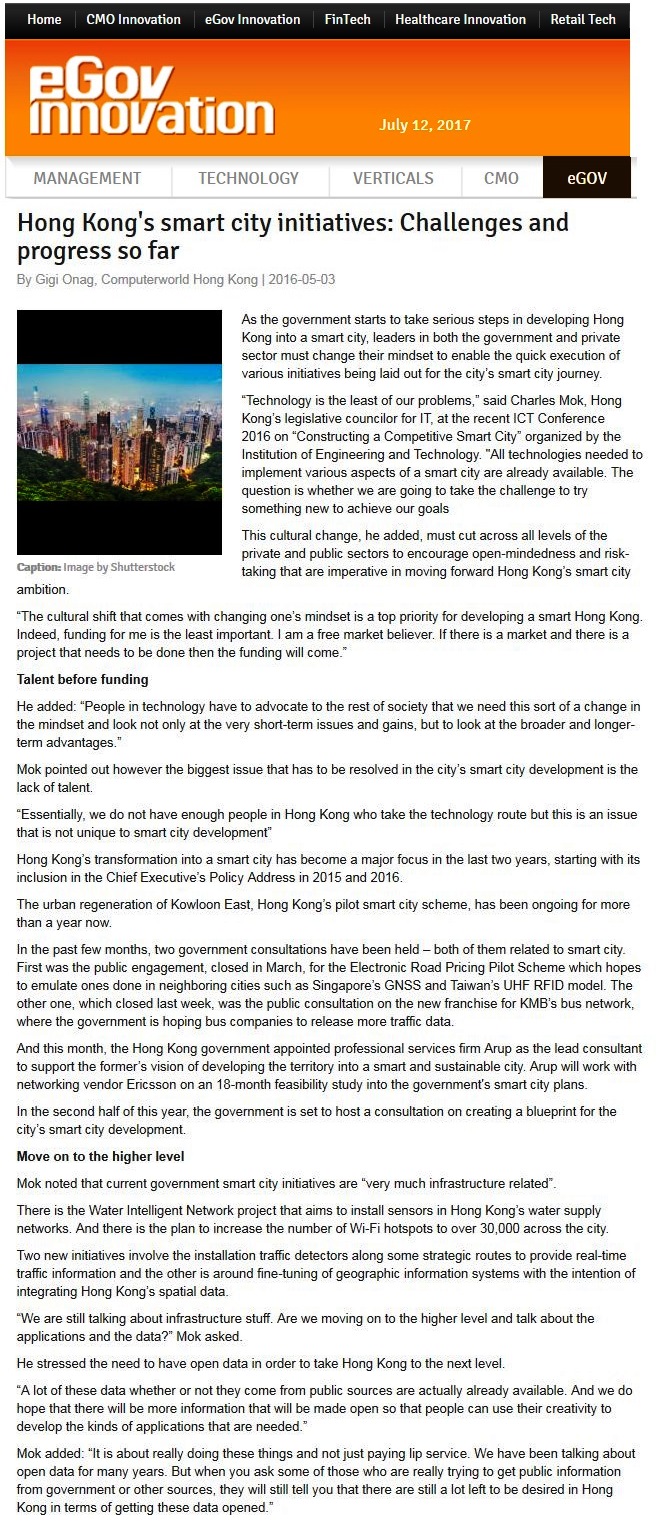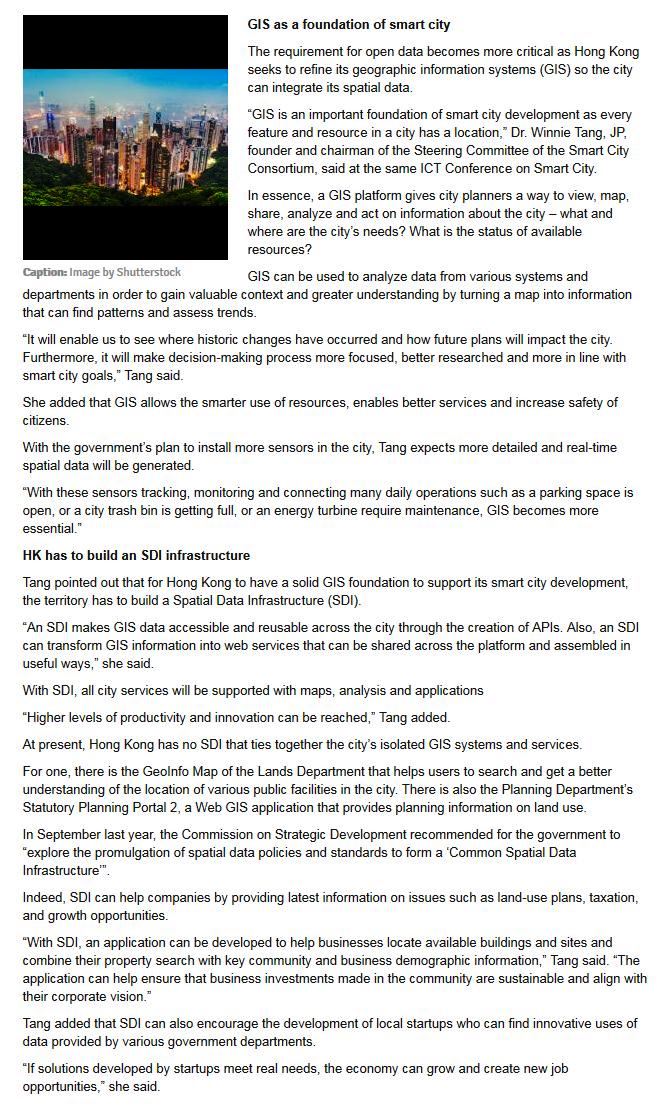網上版請按此


Hong Kong's smart city initiatives: Challenges and progress so far
As the government starts to take serious steps in developing Hong Kong into a smart city, leaders in both the government and private sector must change their mindset to enable the quick execution of various initiatives being laid out for the city's smart city journey.
"Technology is the least of our problems," said Charles Mok, Hong Kong's legislative councilor for IT, at the recent ICT Conference 2016 on "Constructing a Competitive Smart City" organized by the Institution of Engineering and Technology. "All technologies needed to implement various aspects of a smart city are already available. The question is whether we are going to take the challenge to try something new to achieve our goals
This cultural change, he added, must cut across all levels of the private and public sectors to encourage open-mindedness and risk-taking that are imperative in moving forward Hong Kong's smart city ambition.
"The cultural shift that comes with changing one's mindset is a top priority for developing a smart Hong Kong. Indeed, funding for me is the least important. I am a free market believer. If there is a market and there is a project that needs to be done then the funding will come."
Talent before funding
He added: "People in technology have to advocate to the rest of society that we need this sort of a change in the mindset and look not only at the very short-term issues and gains, but to look at the broader and longer-term advantages."
Mok pointed out however the biggest issue that has to be resolved in the city's smart city development is the lack of talent.
"Essentially, we do not have enough people in Hong Kong who take the technology route but this is an issue that is not unique to smart city development"
Hong Kong's transformation into a smart city has become a major focus in the last two years, starting with its inclusion in the Chief Executive's Policy Address in 2015 and 2016.
The urban regeneration of Kowloon East, Hong Kong's pilot smart city scheme, has been ongoing for more than a year now.
In the past few months, two government consultations have been held – both of them related to smart city. First was the public engagement, closed in March, for the Electronic Road Pricing Pilot Scheme which hopes to emulate ones done in neighboring cities such as Singapore's GNSS and Taiwan's UHF RFID model. The other one, which closed last week, was the public consultation on the new franchise for KMB's bus network, where the government is hoping bus companies to release more traffic data.
And this month, the Hong Kong government appointed professional services firm Arup as the lead consultant to support the former's vision of developing the territory into a smart and sustainable city. Arup will work with networking vendor Ericsson on an 18-month feasibility study into the government's smart city plans.
In the second half of this year, the government is set to host a consultation on creating a blueprint for the city's smart city development.
Move on to the higher level
Mok noted that current government smart city initiatives are "very much infrastructure related".
There is the Water Intelligent Network project that aims to install sensors in Hong Kong's water supply networks. And there is the plan to increase the number of Wi-Fi hotspots to over 30,000 across the city.
Two new initiatives involve the installation traffic detectors along some strategic routes to provide real-time traffic information and the other is around fine-tuning of geographic information systems with the intention of integrating Hong Kong's spatial data.
"We are still talking about infrastructure stuff. Are we moving on to the higher level and talk about the applications and the data?" Mok asked.
He stressed the need to have open data in order to take Hong Kong to the next level.
"A lot of these data whether or not they come from public sources are actually already available. And we do hope that there will be more information that will be made open so that people can use their creativity to develop the kinds of applications that are needed."
Mok added: "It is about really doing these things and not just paying lip service. We have been talking about open data for many years. But when you ask some of those who are really trying to get public information from government or other sources, they will still tell you that there are still a lot left to be desired in Hong Kong in terms of getting these data opened."
GIS as a foundation of smart city
The requirement for open data becomes more critical as Hong Kong seeks to refine its geographic information systems (GIS) so the city can integrate its spatial data.
"GIS is an important foundation of smart city development as every feature and resource in a city has a location," Dr. Winnie Tang, JP, founder and chairman of the Steering Committee of the Smart City Consortium, said at the same ICT Conference on Smart City.
In essence, a GIS platform gives city planners a way to view, map, share, analyze and act on information about the city – what and where are the city's needs? What is the status of available resources?
GIS can be used to analyze data from various systems and departments in order to gain valuable context and greater understanding by turning a map into information that can find patterns and assess trends.
"It will enable us to see where historic changes have occurred and how future plans will impact the city. Furthermore, it will make decision-making process more focused, better researched and more in line with smart city goals," Tang said.
She added that GIS allows the smarter use of resources, enables better services and increase safety of citizens.
With the government's plan to install more sensors in the city, Tang expects more detailed and real-time spatial data will be generated.
"With these sensors tracking, monitoring and connecting many daily operations such as a parking space is open, or a city trash bin is getting full, or an energy turbine require maintenance, GIS becomes more essential."
HK has to build an SDI infrastructure
Tang pointed out that for Hong Kong to have a solid GIS foundation to support its smart city development, the territory has to build a Spatial Data Infrastructure (SDI).
"An SDI makes GIS data accessible and reusable across the city through the creation of APIs. Also, an SDI can transform GIS information into web services that can be shared across the platform and assembled in useful ways," she said.
With SDI, all city services will be supported with maps, analysis and applications
"Higher levels of productivity and innovation can be reached," Tang added.
At present, Hong Kong has no SDI that ties together the city's isolated GIS systems and services.
For one, there is the GeoInfo Map of the Lands Department that helps users to search and get a better understanding of the location of various public facilities in the city. There is also the Planning Department's Statutory Planning Portal 2, a Web GIS application that provides planning information on land use.
In September last year, the Commission on Strategic Development recommended for the government to "explore the promulgation of spatial data policies and standards to form a 'Common Spatial Data Infrastructure'".
Indeed, SDI can help companies by providing latest information on issues such as land-use plans, taxation, and growth opportunities.
"With SDI, an application can be developed to help businesses locate available buildings and sites and combine their property search with key community and business demographic information," Tang said. "The application can help ensure that business investments made in the community are sustainable and align with their corporate vision."
Tang added that SDI can also encourage the development of local startups who can find innovative uses of data provided by various government departments.
"If solutions developed by startups meet real needs, the economy can grow and create new job opportunities," she said.